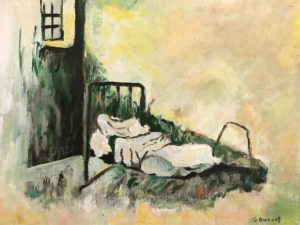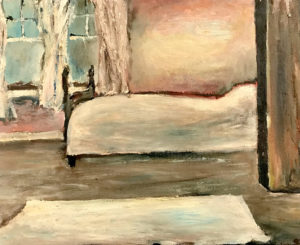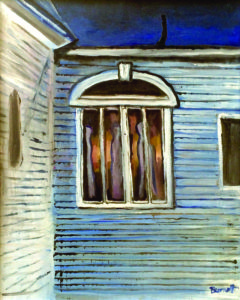February 20, 2017
Elms College to host art exhibition and colloquium addressing mental health issues
REGIONAL
Staff report

Paintings by Genevieve Mae Burnett (IObserve photos/courtesy of Anchor House of Artists and Elms College)
CHICOPEE – The Borgia Gallery at College of Our Lady of the Elms, in collaboration with Anchor House of Artists in Northampton, will present a retrospective exhibition of artwork by the late Genevieve Mae Burnett, an artist who struggled with extreme schizophrenia.
“Genevieve Mae Burnett: A Retrospective” will be on display in the gallery from 8:30 a.m. to 4 p.m. daily March 2-24, except college holidays. An opening reception will be held from 4 to 6 p.m. Thursday, March 2. The gallery is located on the second floor of the Dooley College Center on the Elms campus at 291 Springfield St.

Burnett produced prodigious amounts of art throughout her life, exhibited widely, and sold pieces into fine collections – and she accomplished all this in spite of the persecutory auditory hallucinations she battled from childhood. She died in 2015; in her last months, she was diagnosed with lung cancer, but continued the struggle to produce to the end. Her intellectual property – artwork and writings – was assigned to the care of the Anchor House of Artists, and this exhibit is assembled from that collection.
“Burnett’s work is beautiful, making masterful use of color and composition to reach out to the vulnerable, human core we all share,” said Borgia Gallery curator Cecily Hughes. “Her work is atmospheric and often haunting, evoking the feeling of once-familiar places.”
This exhibit is presented in collaboration with Anchor House of Artists, an organization based in Northampton whose mission is to support the creative careers of artists who live with serious mental illnesses, to fight social stigmas about mental illness, and to contribute to cultural enrichment in western Massachusetts and beyond.
“On the face of it, that a shadow-dwelling woman made small oil paintings continuously and wrote about her visual experiences each day of her 70 years sounds like an intriguing story – that is, until you see the paintings,” said Anchor House’s director, Michael Tillyer. “Then, the life that is an oddity becomes diminished by the sheer artistic power that the paintings project.”
“These paintings are the work of a truly gifted artist – and, at the same time, they are the work of a person with severe schizophrenia. They are both, and cannot be reduced to one or the other, a testament that mental illness is a complex part of a greater whole person,” Hughes said. “I hope this exhibition provokes gallery visitors to examine their own ideas about mental illness and to feel a stronger connection to the threads, such as fear and aspiration, that link us all.”
March 23 colloquium open to public
To complement the exhibit, Hughes is working with Kathleen Scoble, dean of the School of Nursing, and Janet Lucier, assistant clinical professor, to plan a free public colloquium on art and mental health. The colloquium will be held from 5 to 7 p.m. Thursday, March 23, in the Borgia Gallery. Tillyer will be joined by Lucier and others to discuss creativity and mental illness in the healthcare system from the perspective of Burnett’s life and work. Attendees are invited to participate through questions and discussion.

“This colloquium will provide a venue for the public to learn about and discuss mental illness – its complexities, realities and common misconceptions – through an artist’s life and work. Speakers from both the art world and health professions will bring multiple perspectives, painting a fuller picture,” Hughes said.
“Despite Genevieve Mae Burnett’s illness, she was able to do what so very few can. This says nothing about art as a healing activity but speaks volumes about the power of art to challenge and transform society’s preconceptions of age, gender, illness, and creativity,” Tillyer said.


 Facebook
Facebook Youtube
Youtube
